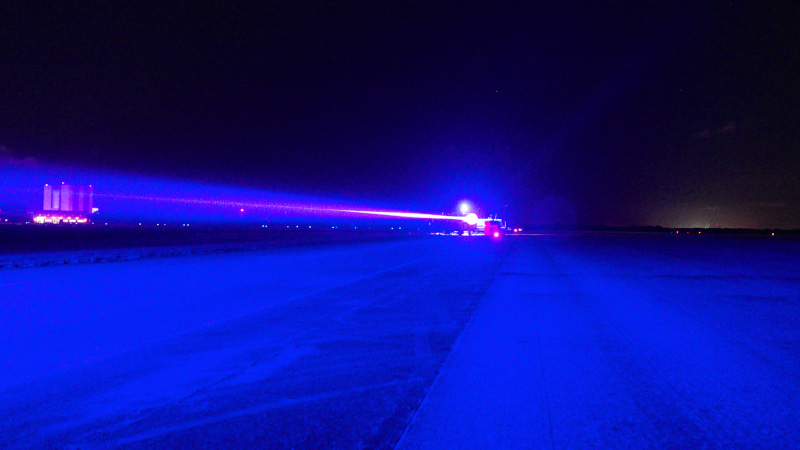Optical Power Beaming Demonstration Conducted at Kennedy Space Center
Star Catcher Proves Path to Scalable Power Grid for Space
A new world record for wireless optical power transmission has been conducted by Star Catcher at NASA’s Kennedy Space Center in Florida. The demonstration surpassed the previous benchmark set by the U.S. Defense Advanced Research Projects Agency (DARPA).
“These real-world results offer definitive proof of the soundness and maturity of our approach to building a resilient orbital power grid.”
Andrew Rush, StarCatcher
In less than eight months since debuting its power beaming technology, Star Catcher recently completed a series of historic optical power beaming tests at NASA’s Kennedy Space Center to validate core technologies for its orbital energy grid, the Star Catcher Network. Using an advanced suite of multi-wavelength lasers, the team delivered more than 1.1 kW of electrical power to commercial off-the-shelf solar panels at Space Florida’s Launch and Landing Facility. The most recent record high was 800 watts set by DARPA in May 2025. Star Catcher delivered more than 10 megajoules of energy throughout the test campaign.
To date, Star Catcher has signed six Power Purchase Agreements collectively valued in the tens of millions of dollars in annual recurring revenue through the end of the decade. These agreements have been signed with organizations operating across core markets including orbital data infrastructure, remote sensing, and satellite platforms.
“Our existing Power Purchase Agreements confirm that the market understands both the value and scalability of our technology to revolutionize power delivery beyond Earth,” said Andrew Rush, CEO and Co-Founder of Star Catcher. “These real-world results offer definitive proof of the soundness and maturity of our approach to building a resilient orbital power grid.”
Power generation is the fundamental limiting factor of space-based capabilities. Today’s satellites can’t generate enough power on their own to keep up with the growing demands of modern space missions such as direct-to-cell connectivity, AI-powered Earth observation, and agile maneuvering for defense applications. Using space-based optical power beaming, the Star Catcher Network collects and concentrates sunlight in orbit, refines it into optimized wavelengths for spacecraft solar panels, and wirelessly transmits it to client satellites, allowing them to generate two to ten times more power, on-demand, with no retrofit required.
“Space has waited decades for its energy revolution,” said Howard Morgan, Chair and General Partner of B Capital. “Star Catcher just delivered it.”
During the demonstration, Star Catcher delivered one to ten Suns of optical energy to multiple commercial off-the-shelf single- and triple-junction solar panels commonly used in space, confirming compatibility with standard spacecraft hardware, and validating the company’s approach to “supercharge” satellites with significantly more power via highly concentrated beams of light. Among them was an Astro Digital triple-junction solar panel — the same hardware used on the company’s flight-proven satellite buses — demonstrating readiness to power customer missions in orbit.
Star Catcher also delivered power to several customer payloads representing key market segments such as space data centers, in-space manufacturing, and remote sensing. The systems operated on beamed power as customers conducted live experiments, demonstrating both hardware compatibility and strong interest in this emerging power infrastructure.
Among the demonstrations, Star Catcher wirelessly transmitted energy to Intuitive Machines’ Lunar Terrain Vehicle (LTV) and recharged its onboard batteries. This capability showcases how Star Catcher’s technology could expand the operational envelope of LTVs, enabling more science and continuous operations through the two-week lunar night and within permanently shadowed regions.
Star Catcher will launch its first on-orbit power beaming demonstration in 2026.



